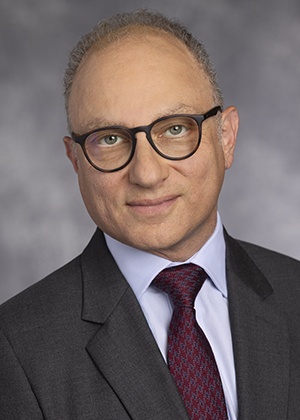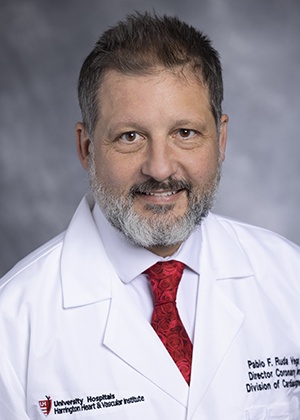
Robotic Cardiac Surgery
Robot-assisted cardiac surgery is a minimally invasive approach offering the highest level of precision and faster patient recovery. The cardiac surgeons at University Hospitals Harrington Heart & Vascular Institute use the da Vinci Robotic Surgical System to perform robotic coronary artery bypasses and other heart surgeries with remarkable outcomes.
Your health is important. Get expert care.
Call 216-844-4004.
Why Choose University Hospitals Harrington Heart & Vascular Institute for Your Robotic Cardiac Surgery?
University Hospitals (UH) Harrington Heart & Vascular Institute’s cardiac surgery program is top-rated. Our team provides advanced minimally invasive and complex cardiac surgery techniques available only at select other institutions across the country.
Our expertise in robot-assisted cardiac surgery is well established. Due to the fast growth and success of our program, we also offer virtual consultations and second opinion service.
In recognition of clinical excellence, our program has earned the highest 3-star rating for coronary artery bypass graft (CABG) overall quality by the Society of Thoracic Surgeons.
What Procedures can be Performed as Robotic Cardiac Surgery?
At University Hospitals Harrington Heart & Vascular Institute, we use the da Vinci robotic surgical system to perform a wide array of minimally invasive heart surgeries.
These procedures include:
- Coronary artery bypass grafting (CABG)
- Mitral valve repair/replacement
- Epicardial lead placement
- Ablation for atrial fibrillation
- Ligation of the left atrial appendage
- Pericardial resection
- Tricuspid valve repair/replacement
- Atrial septal defect/patent foramen ovale (PFO) closure
- Resection of intracardiac masses/tumors
Robotic Cardiac Surgery Vs. Traditional Cardiac Surgery – A Difference in Approach
Traditional cardiac surgery requires entry into the chest via a sternotomy. This requires a 6- to 8- inch incision that runs the length of the sternum. The sternum is then divided. At the end of the surgery, the sternum is put back together with wires or plates that hold the sternum together while it heals. Healing of the bone takes about 6 weeks, during which time patients cannot drive or do any heavy lifting.
In contrast, robot-assisted cardiac surgery is minimally invasive and requires only a few very small incisions to be made between the ribs. The robot supports enhanced visualization through high-definition cameras, which provides surgeons with greater dexterity and control than other methods. Patients can return to driving and resume their regular activities without restrictions shortly after surgery.
Potential Benefits of Robotic Cardiac Surgery
Robotic cardiac surgery offers many benefits for patients including:
- Shorter hospital stays.
- Faster recovery and return to normal activities.
- Less scarring, pain and risk of infection.
- Less blood loss and need for blood transfusions.
- Reduced risk of stroke.
- Higher patient satisfaction.
Risks of Robotic Cardiac Surgery
As with any kind of surgery, there are always potential risks. However, since your surgeon does not have to cut through the breastbone to open your chest during robotic surgery, this removes many of the potential complications associated more with open-heart surgery.
In some cases, your surgeon may not be able to complete the surgery with the robot. If this happens, you will need open-heart surgery. Based on your medical condition, your healthcare provider will discuss what your specific risks are prior to your surgery.
What Happens Before Robotic Cardiac Surgery?
To determine if you’re a good candidate for robotic cardiac surgery, your doctor will review your medical history and your heart condition. Your provider will also conduct a physical exam to make sure you are healthy enough to undergo the procedure. In addition, your provider may order blood tests and/or other diagnostic tests. Once you are approved for the surgery, your care team will provide you with specific instructions to prepare for procedure.
What Happens During Robotic Heart Surgery?
During robotic cardiac surgery, the surgeon is always in complete control of the surgical tools. The robotic “arm and wrist” motions mimic those of the surgeon but offer more dexterity and precision beyond what human hands are capable.
Every procedure is different, but typically robot-assisted heart surgery proceeds as follows:
- Three small incisions are made in the spaces between the ribs. The largest of these incisions is often called the “the working port.”
- Robotic arms help guide surgical tools and a high-definition 3D camera through the ports.
- The camera is controlled using a foot pedal, allowing the surgeon to zoom in and out as necessary.
- All surgical tools are removed before closing the incisions.
What Happens After Robotic Cardiac Surgery?
Following robotic cardiac surgery, most patients stay in the hospital for a few days. Many people can manage their post-surgical pain with over-the-counter pain relievers such as ibuprofen or acetaminophen. Your healthcare provider will give you instructions about how to keep your surgical incisions clean and dry.
Most people can resume normal activities after a few weeks. Your doctor may provide specific recommendations for exercise and lifestyle changes to optimize your heart health and arrange for follow-up appointments to monitor your progress.
Who Performs Robotic Cardiac Surgery at University Hospitals?
Yasir Abu-Omar, MD, PhD
- Cardiac Surgery
-
Cleveland (0 mi.)
Beachwood (7 mi.)
Pablo Ruda Vega, MD
- Cardiac Surgery
-
Beachwood (7 mi.)
Cleveland (0 mi.)
Parma (11 mi.)
Willoughby (12 mi.)
Elyria (28 mi.)
Make an Appointment
For more information, or to schedule an appointment with one of our heart surgeons, call 216-844-4004.
Find a Cardiac Surgeon



